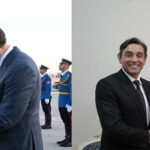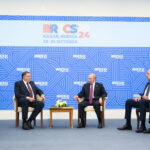- Novi Sad tragedy could lead to government crisis in Serbia
Fourteen people died and three were seriously injured as a result of partial collapse of a canopy at the rail station in Novi Sad (Serbia) around 12:00 on November 1.
Built in 1964, the station building was renovated in 2021-2024 by a Chinese consortium as part of the high-speed railway construction from Novi Sad to the state border with Hungary via Subotica.
The canopy that collapsed was not subject to reconstruction according to plan that has been approved. Only the interior of the rail station, the roof, and the facade above and below the canopy were subject to renovation.
In the wake of the tragedy, the President of Serbia, Aleksandar Vučić, appealed to the prosecutor’s office and government to severely prosecute those responsible.
The Minister of Construction, Transport and Infrastructure, Goran Vesic, stepped down two days into the tragic accident. However, he never took responsibility for the tragedy. According to Vesic, all project paperwork had been drawn up prior to his appointment, adding that the ministry could not influence the project and quality of works performed in Novi Sad.
In Belgrade and Novi Sad, residents took on the streets for mass protests under the slogans “Corruption kills”, demanding that the prime minister resign alongside city mayor.
The tragedy in Novi Sad may lead to a government crisis, which will end, most likely, in its ultimate reformation.
- European Commission report: corruption major issue in Western Balkans
The conclusions laid down in the recently published reports of the European Commission on the Western Balkans’ countries, see corruption as one of the biggest remaining obstacles on the region’s path toward the European Union. During the reporting period, only Montenegro made significant progress in the fight against corruption, while North Macedonia failed to do so. In Albania, Bosnia and Herzegovina, and Serbia, the European Commission noted certain progress, while Kosovo made limited progress in the fight against corruption.
The European Commission issued recommendations for each candidate country for the next year.
Albania should strengthen the investigation, prosecution, sentencing, and final convictions in corruption cases, particularly at high-level ones, including the ultimate confiscation of criminal assets, and effectively implement action plans on integrity in public institutions most prone to corruption.
Bosnia and Herzegovina should intensify the implementation of regulations on the prevention of conflicts of interest and protection of whistleblowers through adopting new legislation; and demonstrate progress in the fight against top-tier corruption.
Kosovo should continue to strengthen the capacity of the Agency for the Prevention of Corruption (APC) in terms of staffing and expertise to ensure that it effectively fulfills its mandate. Among other tasks is the further implementation of the current anti-corruption legislation and ensuring better quality of high-level corruption probes.
Montenegro should, in particular, ensure a further improvement of results in the fight against corruption, including high-level graft, by strengthening the effective application of existing criminal legislation by prosecutors and courts. Also among the necessary steps are changes to the Law on Financing Political Entities and the Election Campaign to increase transparency and control the expenses of political parties.
North Macedonia should adopt a new Criminal Code in line with EU and international standards; improve the investigation of high-level corruption cases, and ensure seizure of illegitimate assets.
Serbia should continue to improve quality of investigations, prosecutions, and final judgments in high-level corruption cases, including on the seizure and confiscation of criminal assets.
The mandate of the EU military mission in Bosnia and Herzegovina has been extended
The UN Security Council unanimously by 15 votes extended the mandate of the European Union military mission in Bosnia and Herzegovina (EUFOR Althea) for one year, until November 2025, adopting the corresponding draft resolution.
Operation Althea – European Union Forces (EUFOR) in Bosnia and Herzegovina – is a military mission to monitor the military implementation of the Dayton Peace Agreement.
The resolution was presented by France, which emphasized the importance of the presence of EU forces to maintain peace and stability in the region.
The vote demonstrated unanimity among the members of the UN Security Council, including Russia and China, regarding the implementation by the EU Forces of the peacekeeping mission in Bosnia and Herzegovina.
- Companies from Serbia and Montenegro come under U.S. sanctions
The United States has imposed sanctions against nearly 400 individuals and entities from dozens of different countries for providing military support to Russia. This step by the U.S. government is the largest sweep aimed at combating sanctions evasion through third countries, State Department officials said.
Restrictive measures were applied, in particular, to two entities based in Serbia and Montenegro.
The Serbian company Ventrade DOO, based in Subotica, was sanctioned based on the U.S. government executive order (EO 14024) over providing financial, material, and technological support to the Russian company PromSvyazRadio or sending it goods and services. As reported, Ventrade exported military-grade radios to Russia.
In the period from September 2022 to June 2023, Ventrade sold PromSvyazRadio goods worth nearly EUR 529,000.
Ventrade was founded by a Hungarian national on April 6, 2022, less than two months after Russia’s full-scale invasion of Ukraine. Zsolt Lajgut, also a Hungarian national, became director and founder of the company in July 2023.
The Montenegrin company International Business Corporation Bar DOO (IBC), owned by Russian citizen Sergey Kokorev, was also designated for exporting military equipment from Montenegro to Russia. According to the statement by U.S. authorities, Kokorev used his company to supply Eueopean-made parts to customers in Russia.
- Serbia’s Vice Prime Minister visits Belarus
Serbian Deputy Prime Minister Aleksandar Vulin came to Belarus on a three-day official visit. He took part in the 2nd Minsk International Conference on Eurasian Security, where he gave a speech, and also met with high-ranking officials from Belarus and other countries.
On the sidelines of the event, the Deputy Prime Minister of Serbia discussed “the situation of the Balkan region, primarily of Kosovo and Metohija”, as well as other aspects of international politics, with the head of the Russian Foreign Ministry, Sergei Lavrov.
The Serbian official also met with the State Secretary of the Belarusian Security Council, Aleksandr Volfovich. After the meeting, Vulin noted that Serbia and Belarus can fight together against foreign interference in internal affairs and “color revolutions”.
The meeting of with the Minister of Internal Affairs of Belarus, Ivan Kubrakov, took place in the village of Goran near Minsk, where a police training center is located. The Serbian delegation saw an exhibition of weapons and equipment. The parties discussed cooperation between Belarusian and Serbian security agencies in the fight against terrorism, as well as the expansion of contacts between police educational institutions of the two countries.
Vulin’s visit to Belarus once again demonstrated that in the field of security, Serbia cooperates and will continue cooperating with Russia’s closest military ally. In addition, the West, including the EU, is perceived by the Serbian leadership as hostile forces, which, in their opinion, stand behind the attempt to orchestrate “color revolutions”, including in Belarus.



